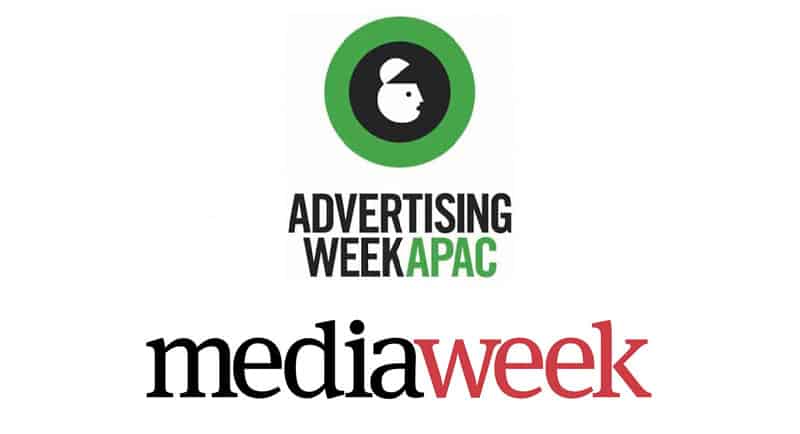Day one of Advertising Week APAC kicked off with flocks of media, agency and adverting industry folk flocking to Sydney’s Luna Park on Sydney Harbour.
The event featured a range of interesting, informative, inspiring and thought-provoking sessions, and the Mediaweek team attended a number of sessions throughout the day.
Check out the recap of the sessions from day one below:
Power, Innovation and the Issues That Matter
In a free-flowing chat hosted by Mediaweek’s Greg Graham that brought together some of the top powerbrokers from the Agency 50 Power List. Aimee Buchanan, CEO, GroupM Australia & New Zealand, Mark Coad, CEO, Mediabrands Australia, and Melissa Fein, CEO, Initiative Australia had an inspiring conversation on what power really means, how they drive innovation and the big client issues that matter right now.
The conversation started with a literal tractor measuring contest with Buchanan’s three tractors beating out Coad’s one tractor and Fein’s zero.
The conversation then moved to a range of topics including how to get the right mix of what is driving sales growth and how CMOS can justify their ad spend more than ever.
The panel also discussed how the world has shifted and that middle Australia is struggling and the fragmented media market.
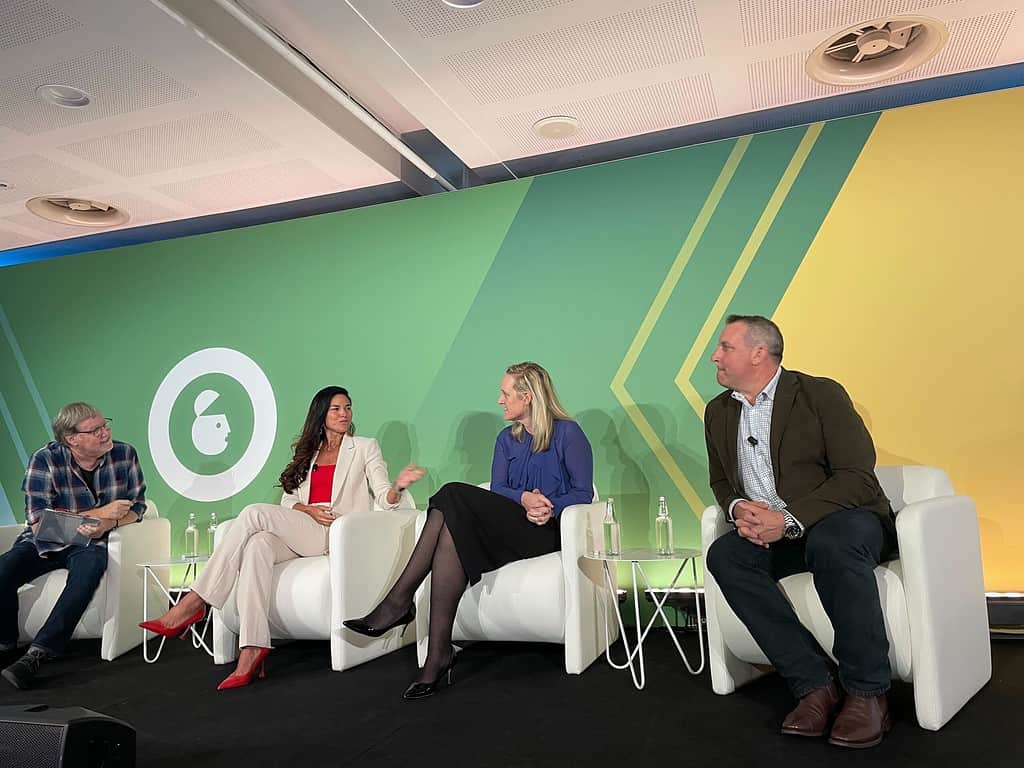
Greg Graham, Melissa Fein, Aimee Buchanan, Mark Coad
Growing Brands in the New Economy
The session started with Ryvalmedia’s Head of Product & Innovation, Jonathan Henshaw,discussing the strained global economic environment and how negative business results are no longer acceptable and how brands must deliver more with less. And how clients need to be brave and sign up to a new world media plan.
Henshaw presented his companies seven New Economy pillars:
– Embrace Digital Transformation
– Innovation & Flexibility Are Rewarded
– Adopt Customer Centric Approach
– Increase Corporate Responsibility
– Collaboration is a Must
– Skills & Training Are Key
– You Must Stay Ahead of Trends
The session then moved into a panel hosted by Natalie Stanbury, Director of Research, IAB with Henshaw, Ryan Gracie, Chief Marketing Officer, MyDeal.com.au and Stefanos Fernandez, Vice President, Digital, Live Nation Entertainment.
The panel discussed the real challenges facing and what tools and strategies should be leveraged to unlock transformative growth in the short term. As well as what metrics are most important and how do brands pivot and optimise for success in a volatile market.
The session also discussed the new economy and how brands rapidly transform with customer needs always evolving.
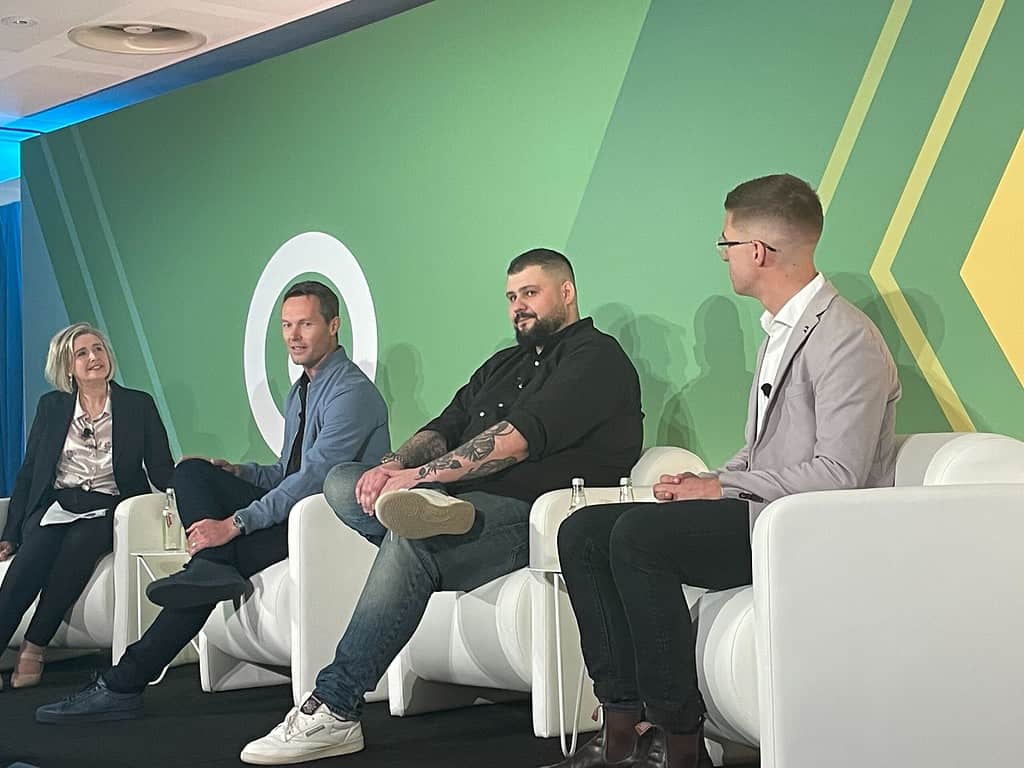
Natalie Stanbury, Ryan Gracie, Stefanos Fernandez, Jonathan Henshaw
WTF is Snapchat? “Inside the World’s Best Known, Least Understood Platform”
In the morning was a discussion about the social media platform, Snapchat, led by Haran Ramachandran, head of creative strategy ANZ Snap Inc. and featuring Uber ANZ’s head of marketing David Griffiths and Princess Polly’s global performance director Kim Zorn.
The trio discussed Snapchat’s place and purpose and how its 7.5m strong Aussie community has driven results for brands. They also discussed working with creators on Snapchat to bring the campaign’s brief to life.
Griffiths said: “I think it’s about them bringing their expertise to it. What you don’t want to do is put too many shackles on people, so it feels like a brand. Transparently, I still think we’ve got work to do in this space. We haven’t nailed it yet,” Griffiths admitted and noted: “It’s not all all success, but I think it’s quite, it’s quite a unique and new area for us that we’re getting into.”
Zorn shared that Princess Polly’s use of content creators on Snapchat but noted that they don’t give tight briefs, saying: “We want them to be themselves and create that organic content.” However, she did note that they had guidelines such as ensuring rooms are tidy for bedroom shots and using the correct phrase of “swipe up to shop”. Zorn added: “They come back with epic content, but we keep it really organic as well.”
Unleashing the Power of Programmatic: Building Commerce Media 2.0
Gai Le Roy, CEO IAB Australia, led the session that explored the power of programmatic and commerce media. As the field continues to evolve and commerce media becomes increasingly sophisticated, retailers and buyers that embrace this approach are set to reap huge rewards.
Le Roy, along with Peter Barry, vice president, Addressability and Commerce Media at PubMatic, Initiative’s recently appointed chief investment officer Paige Wheaton, and Roger Dunn, consultant, Global Retail Media Product Ebiquity plc., discussed and explored the building blocks that advertisers, online retailers and commerce players need to have in place to ensure success.
Le Roy asked Barry about how the Australian market compares to the US and UK, he explained: “It’s worth saying, nobody’s got it all figured out. There’s plenty of stuff still breaks. So, bear in mind that everyone’s still kind of learning. I would say what the US especially has done well is cooperating and collaborating.
“Early stages, I compare it to like maybe programmatic 10 or 12 years ago, and so a lot of retailers who are non-competitive are coming together, they in the US, they typically reside in like Minneapolis, or Cincinnati or Seattle. They like to collaborate and I would suggest any retailers here who are trying to find their way, should plan a trip to the US or to other markets, at least, to speak with them and they will speak with you,” he shared.
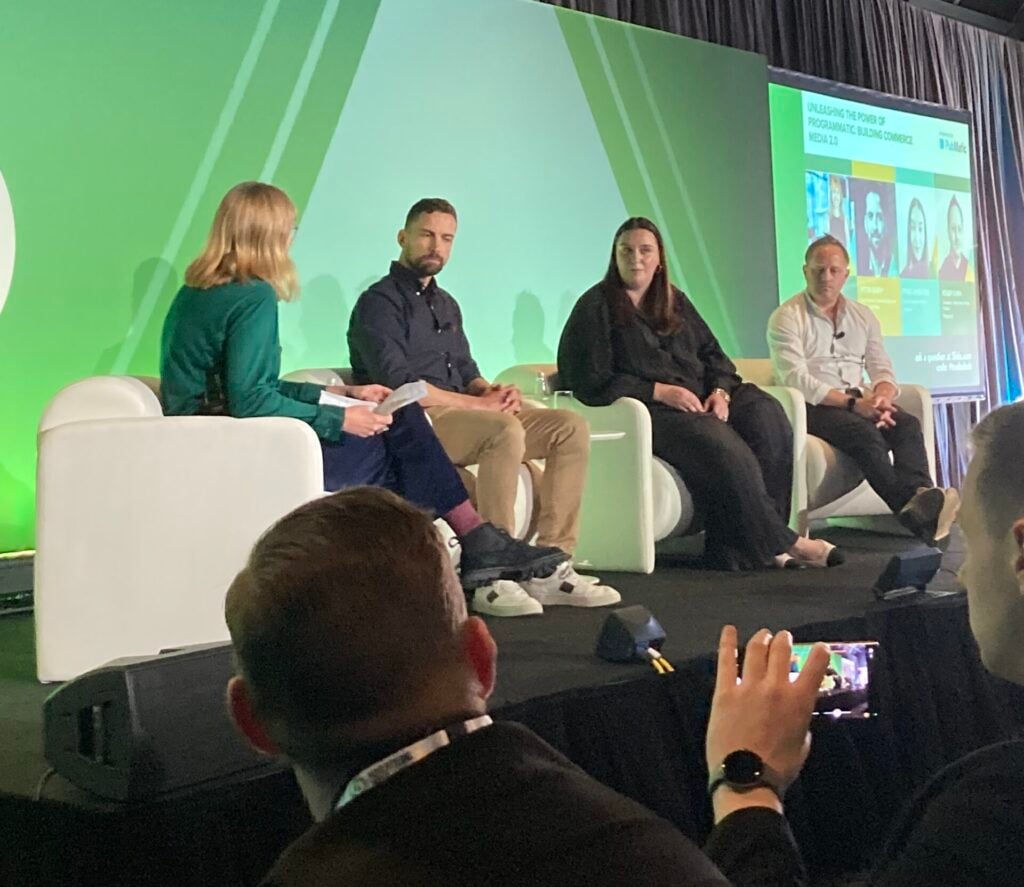
Gai Le Roy with Peter Barry, Paige Wheaton, and Roger Dunn
The Future of Media: How We Got Here and What’s to Come
Samantha Jacobson, CSO and EVP of The Trade Desk, took the audience on a journey of the last five years and addressed the industry’s current state and shared her predictions for the future of media and driving responsible growth.
Jacobson also reflected on a similar speech made five years ago by her boss, the founder and CEO of The Trade Desk, Jeff Green, in which he also shared his outlook for the next five years.
One of his most striking predictions was how “content is king”. Jacobson said: “None of us really realised just how much this would be accelerated through the pandemic.
“If you were to ask me, if I had 10 extra hours in my week – pre pandemic – I would have said I absolutely would be exercising more, other people may have said that they would spend their time cooking or learning how to make meals from scratch. But the reality is when the pandemic hit, and we were all at home, we spent our time watching television, and we watched a lot of television.”
“Whether it was TV, phone computer, when we got to the end of our content list, we found new content. It is amazing the way the pandemic changed consumers expectations for how they wanted to receive content,” she said.
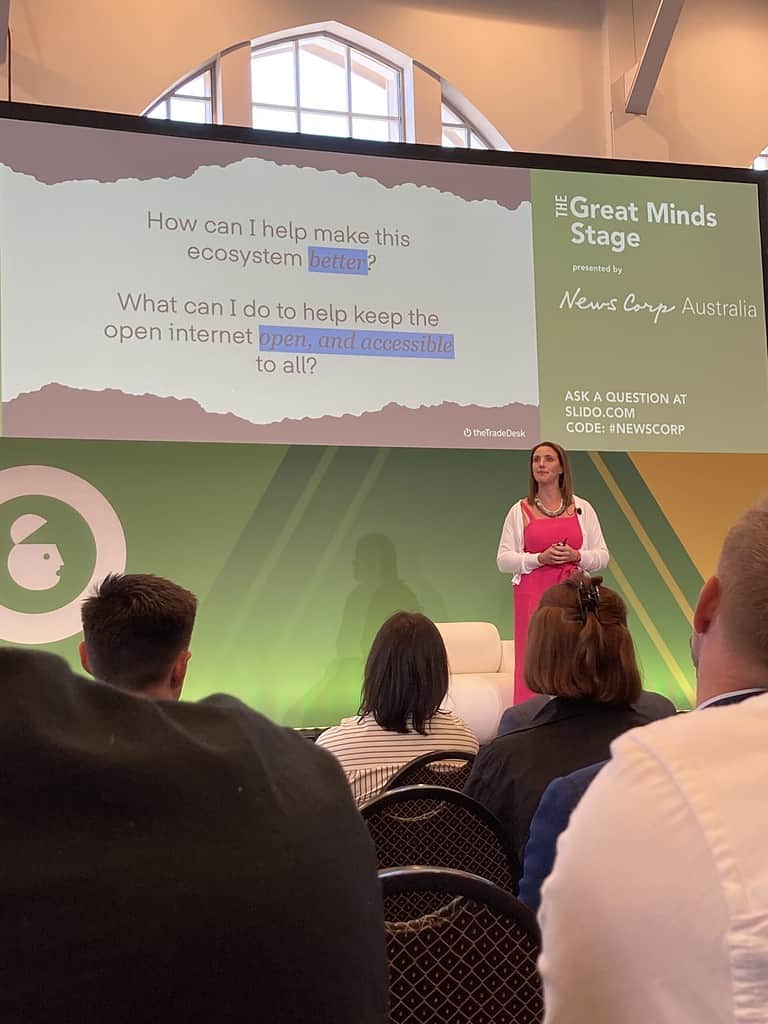
Samantha Jacobson
Shattering Stereotypes: Embracing Age Diversity for a Thriving Ad Industry
Linda Robson, executive director of The Hummingbirds, alongside media industry leader Meredith Ansoul, took to the stage to talk about age diversity in the industry.
Robson with an interactive poll of the room asking which age group people belonged to, and as the ages became more mature, more people sat down to leave a few industry figures standing tall, among them being Mediaweek contributing editor Greg ‘Sparrow’ Graham.
Robson also gave a special mention to Sparrow’s task force, Advertising Ageist Action Group (AGGG), along with its experienced members whose goal it is to make ageism a non-issue in the industry, with the hopes of dismantling the group by 2030.
Ansoul added: “The task force has been set up to show a new future for this industry. A future where we see seasoned professionals standing side by side with fresh young players, together leveraging their potential to create, innovate, solve and service. A future where age can be a badge of honour, not a barrier.”
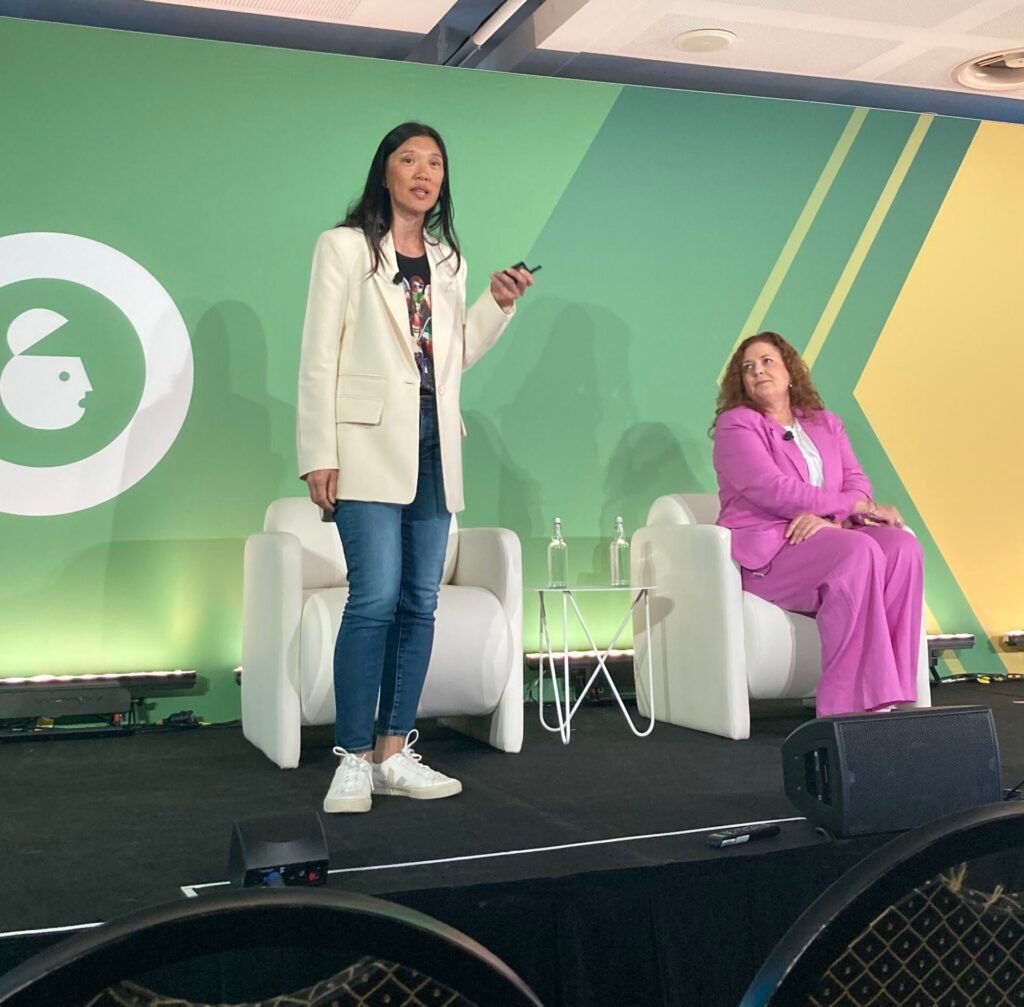
Linda Robson and Meredith Ansoul
Burn Your Briefs! From Bad to Brilliant and Why It Matters
Kenny Hill, CEO & founder of Akkomplice, took the audience through an enlightening, and humorous, list of what not to do with a brief. He noted that brief’s should be well fitting with a good description, not long and saggy but well and simply written, and should not be packed with too much expectations.
Hill highlighted that briefs should not be dirty and hide any negative information, and should address such details. Fifth in the list was the invisible brief, which starts out good but is eventually forgotten before it is taken over with a different brief in mind. That was followed by the cold brief or a brief that is filled with data and information, and lacks any humanity or emotion.
“We make decisions based on emotion and emotion, and heart will always rule the head. At Akkomplice, we stick to this ethos that logic makes people think, and emotion makes people act,” he added.
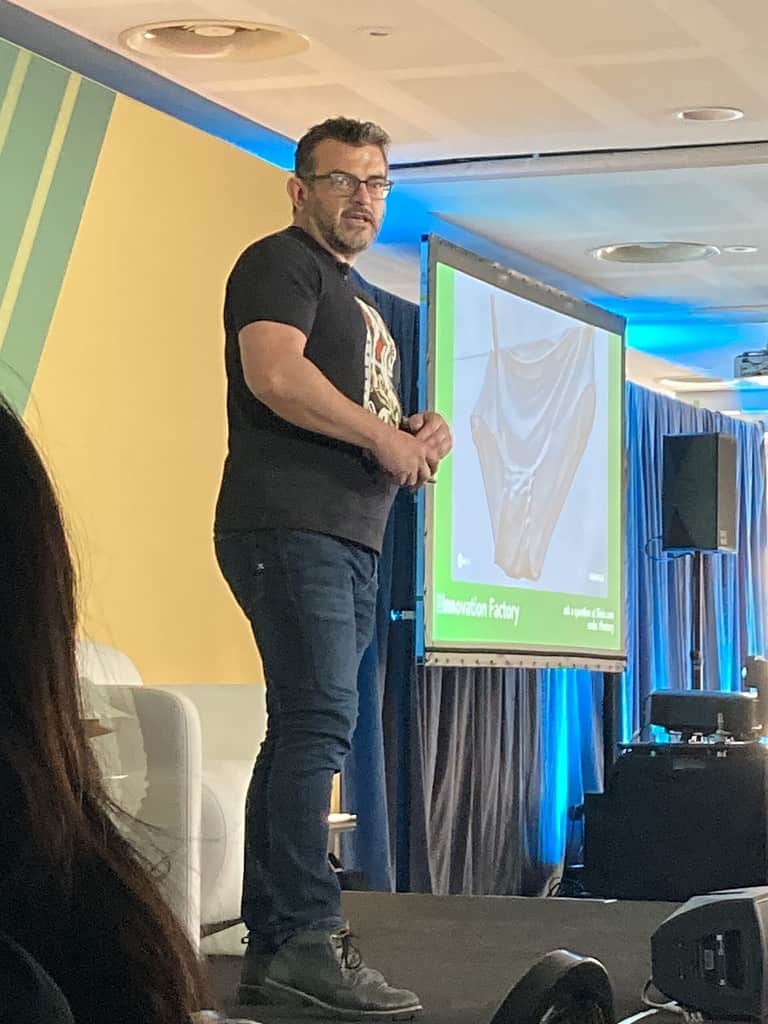
Kenny Hill
Secrets to Success
Sarah Tucker, head of marketing, APAC – enterprise, LinkedIn Marketing Solutions, led a panel featuring Future Is Female nominees – Michaela Tan, account director at GroupM, Olivia Panzic, marketing manager, content & communications for TikTok, and Rosie Chong, social strategist at DDB Melbourne.
Tucker chatted to the leaders about how they’re making progress in their careers, challenges they’ve overcome, helping effect change, breaking barriers and advice for in the industry.
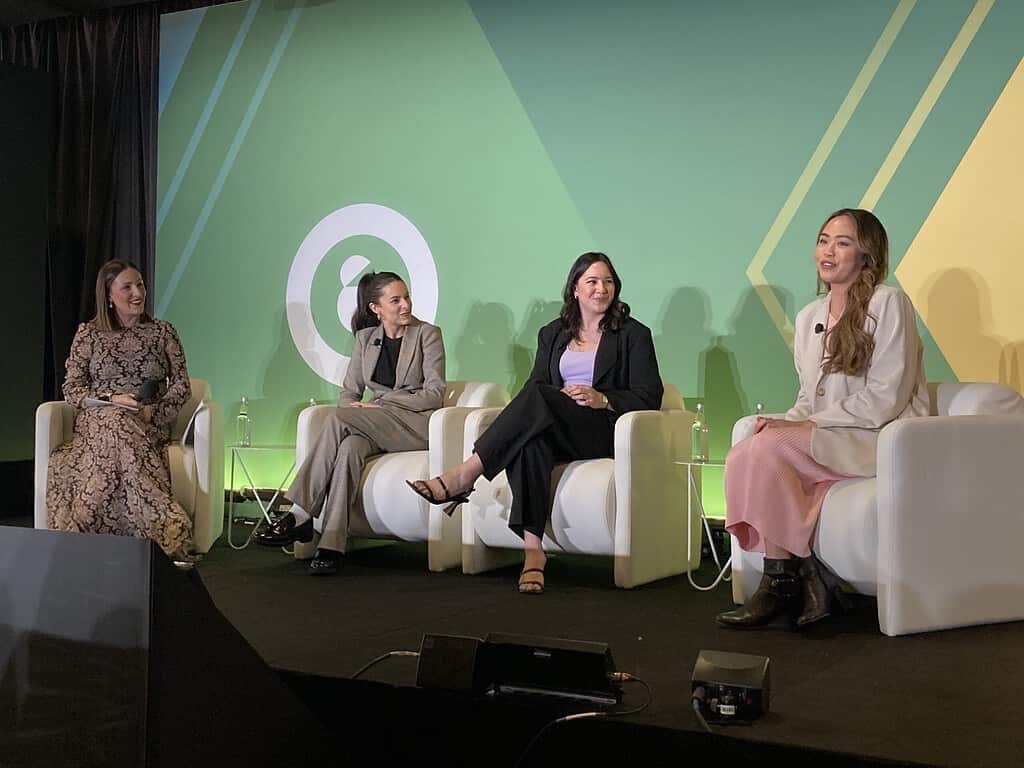
Sarah Tucker, Olivia Panzic, Rosie Chong and Michaela Tan
Creativity and Addressable TV: Where Art Meets Science
Nicole Prior, Microsoft Advertising’s head of buyside technology APAC, was joined by Brett Poole, CEO APAC Finecast, and Alice Charlton (Hughes), client lead GroupM, addressable lead Hogarth, to discuss recently released research on addressable TV by Ampere Analysis with Nexus and Microsoft Advertising, in which 8,000 people responded.
“It was really valuable to study because it honed in on what clients actually thought and the problems they actually had,” Poole said.
Poole noted that there were three points that were of particular interest to him, the first being that addressable TV is here to stay and its growth continues at pace that is driven by streaming, which opens plenty of good opportunities. His second point was how clients thought that addressable TV was effective in the way it was planned.
Poole concluded that the last piece of research that struck him, despite being out of his expertise, was generative AI. He explained: “It is a massive opportunity for some of the friction that clients are seeing and developing the creative strategies that match those addressable audiences. Often we see that creative is seen as expensive or a cost, whereas I think that we should be seeing it as investment and continuing on investment with variations that can get a better result out of the audience’s that we’re targeting with addressable TV.”
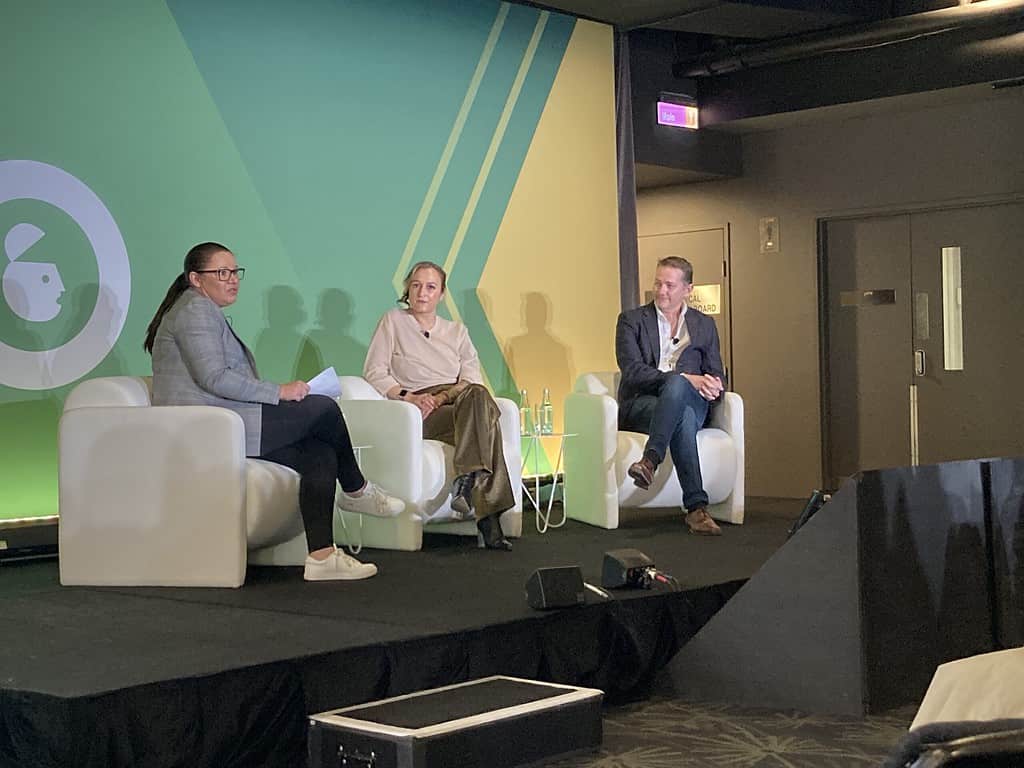
Nicole Prior, Alice Charlton (Hughes) and Brett Poole
How to Automate Your Growth
Susan Werkner and Peter Applebaum, co-founders of The Agency Accelerators, took attendees through a list of how to automate growth. The advent of countless automation platforms and generative AI such as ChatGPT, Jasper and DALL-E, combined with robust strategies, has created unprecedented opportunities to create more predictable and consistent growth for all types of organisations.
The duo explored how marketers can and why they should adopted AI into their work to ensure growth. Applebaum noted that content marketing, email marketing, social media marketing, can all be automated.
“But as we said before, platforms may change, consumer, human behaviour may change. Human nature does not. That’s what we as marketers, that’s our secret sauce, we ensure that we protect and build and thrive in this AI era,” he said.
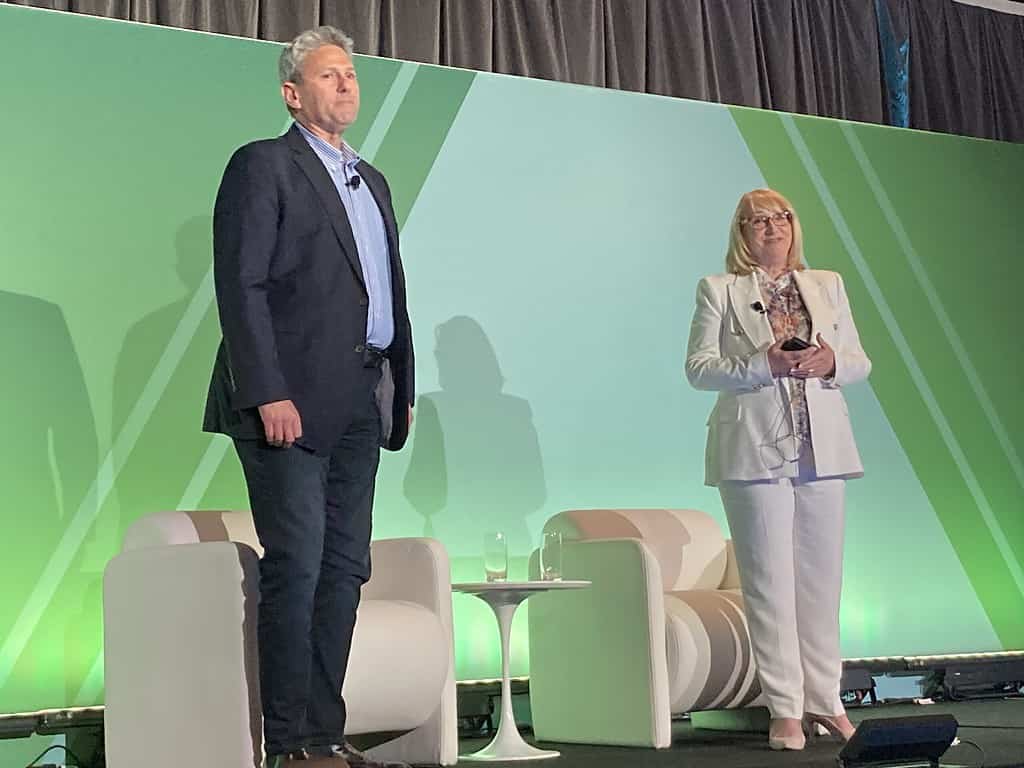
Susan Werkner and Peter Applebaum
Combined Power of the Olympic and Paralympic Movements Towards Brisbane 2032
In the afternoon, Today show sports presenter Alex Cullen hosted a panel that looked forward to the power of Brisbane 2032 Olympic and Paralympic Games.
Cullen was joined by Australian rowing Olympian Ben Dodwell, Rebecca Masci the director – Strategic Engagement, Brand and Marketing Communications Brisbane 2032 Olympic and Paralympic Games Organising Committee, and Louise Sauvage OAM national coach wheelchair track and road Australian paralympic athletics team.
The group looked back at the successes of the Sydney Games in 2000 and shared their outlooks and hopes for the upcoming games what its impact could be on people and communities in Brisbane, Queensland and Australia.
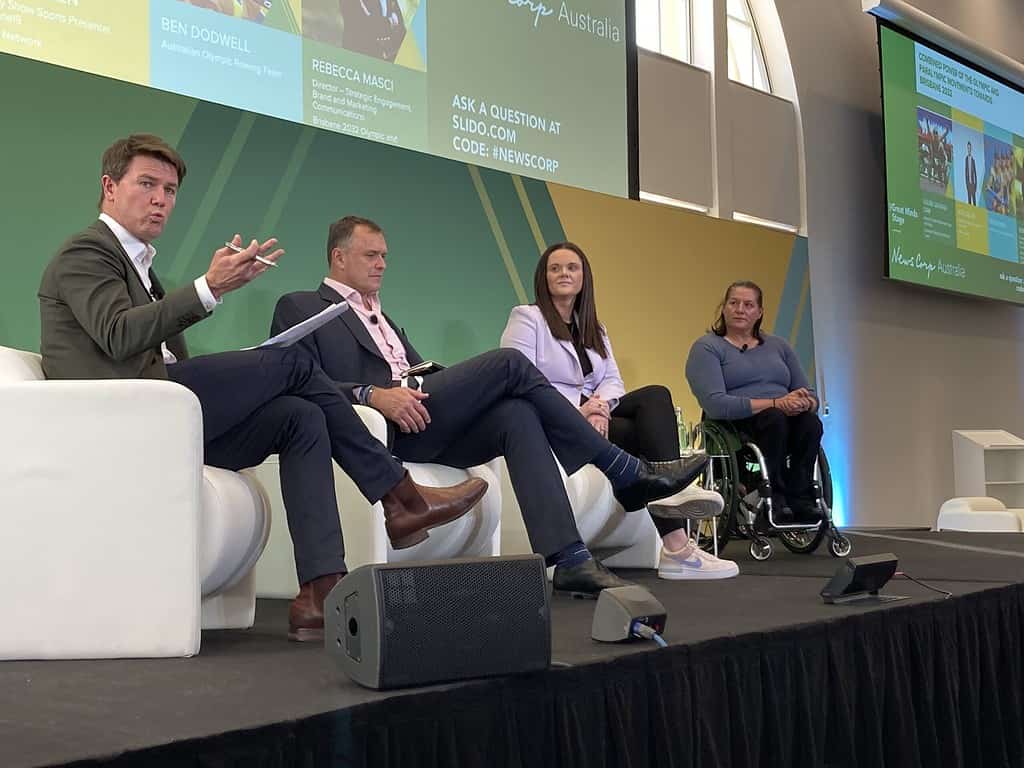
Alex Cullen, Ben Dodwell, Rebecca Masci and Louise Sauvage OAM
WTF is Happening to the Ad-Funded Web?
The internet as we know it – full of cookies and pop-up ads – is not going to be the internet of the future. Thanks to emerging technology, impending regulation, and changing consumer habits, the internet is undergoing an overhaul.
So where does that leave the web giants of today and the brands which fund them?
To answer that question, Alex Hayes (Principal, Clear Hayes Consulting) asked a panel made up of Brett Armstrong (General Manager, Global Business Solutions, TikTok ANZ), John McNerney (Managing Director, AUSEA, Yahoo), Andrea Martens (CEO, ADMA), and Carolyn Bollaci (Head of Media, ANZ, Meta).
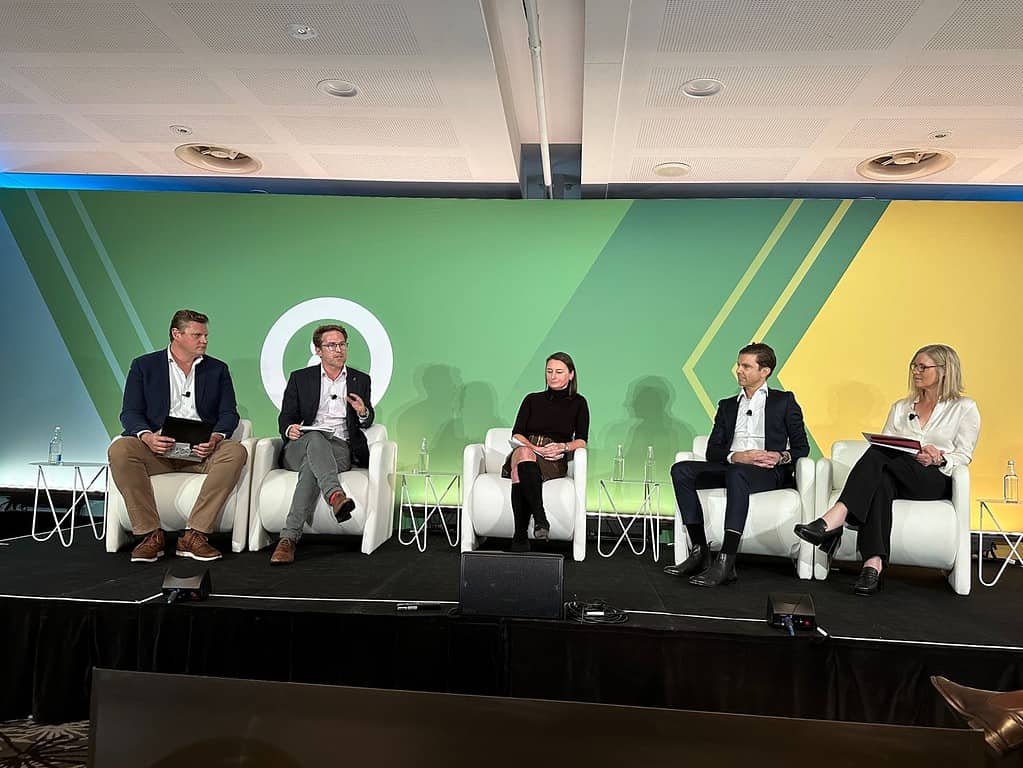
Alex Hayes, John McNerney, Carolyn Bollaci, Brett Armstrong, Andrea Martens
Can Generative AI Unleash Radical Transformation?
AI is one of the hottest topics at the moment, and Microsoft are working to be at the forefront of the evolving tech.
Hosted by Renee Stopps from Microsoft Advertising, the room heard Stopps speak about how AI has been around since the 1960s, and that integration of an AI co-pilot meant that “we humans are always in control” rather than the other way around.
Introducing Darren Stein (CEO, Annalect and MD, Hearts & Science), Kellyn Coetzee (National Head of Media & Analytics, Reprise), Dan Stevens (General Manager – Digital, comparethemarket.com.au), and Adam Goodman (National Agency Lead, ANZ, Microsoft Advertising) to the stage, the panel told the audience how they are upskilling for the future of AI.
When asked what experience that have with generative AI, Coetzee got a laugh when she said that Reprise was embracing the tech “like you embrace your mother-in-law – she’s a part of the family, but she’s not getting the keys to your place”.
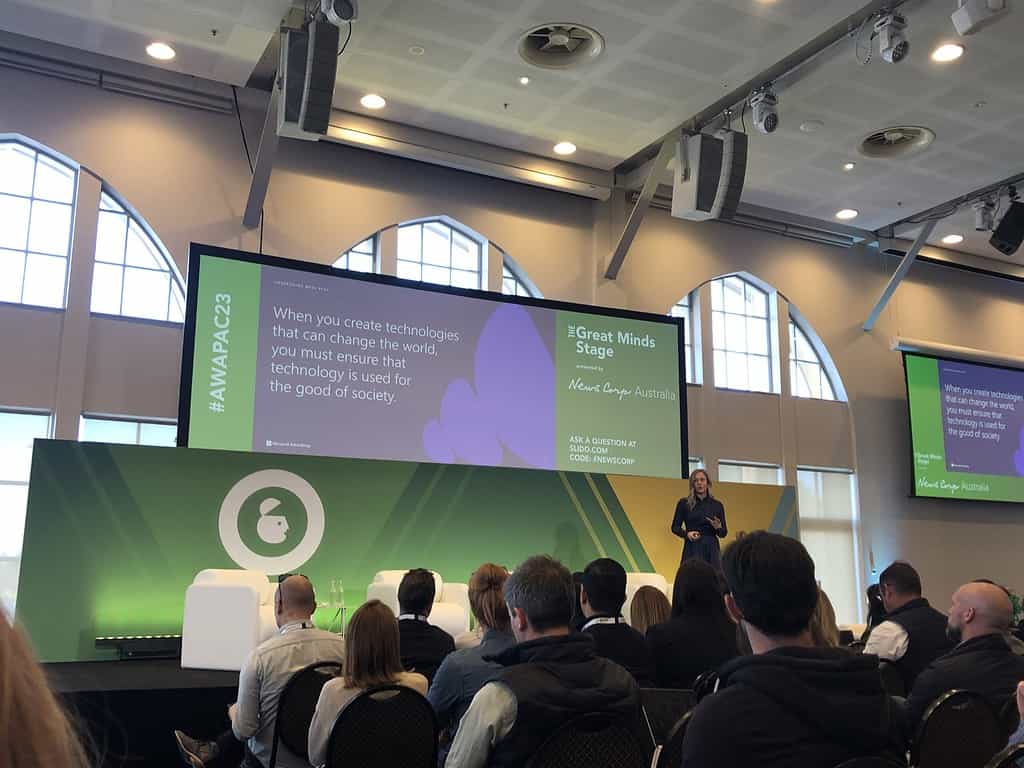
Renee Stopps
Good Chat with Matty Johns and Gary Jubelin
Two podcast heavyweights took to the Great Minds Stage as Matty Johns and Gary Jubelin discussed their transition from their former lives – as a professional NRL player and a homicide detective and respectively – into the media.
Delving into the benefits of being able to get into deep conversations, and how the best way to improve is simply through experience, the pair entertained the crowd with stories of their times on and off the mic. On a more serious note, they also spoke about how conversations with people who are very different from you – in Jubelin’s case, some of his guests are notorious criminals – can open your mind to what it means to live a life other than your own.
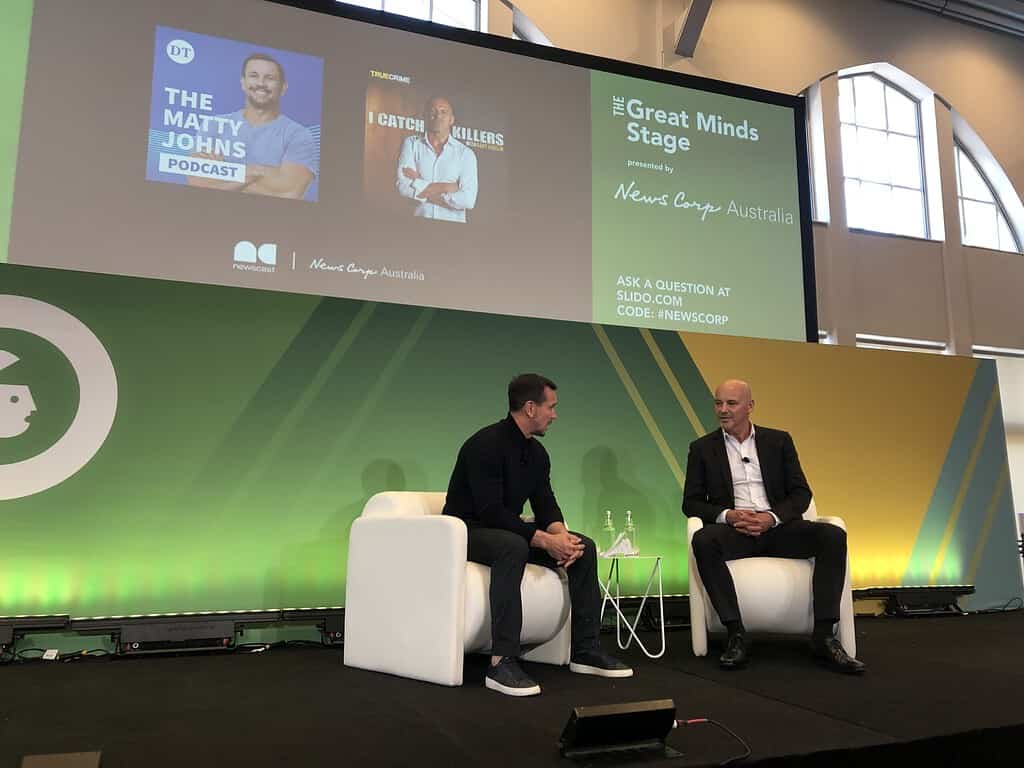
Matty Johns and Gary Jubelin
Nomadvertising: How Genius Steals
Have you ever wanted to just pack your things and take off into the sunset, working remotely from all over the globe? That’s what Genius Steals founders Rosie and Faris Yakob have been doing for over a decade now.
Yahoo’s Elizabeth Herbst-Brady sat down with the Yakobs to discuss the details of their adventurous lives and how they build relationships along the way. Rosie made a point to tell the crowd that personal time is critical, and that she’s working on making sure people know they can log off so their lives aren’t consumed by work.
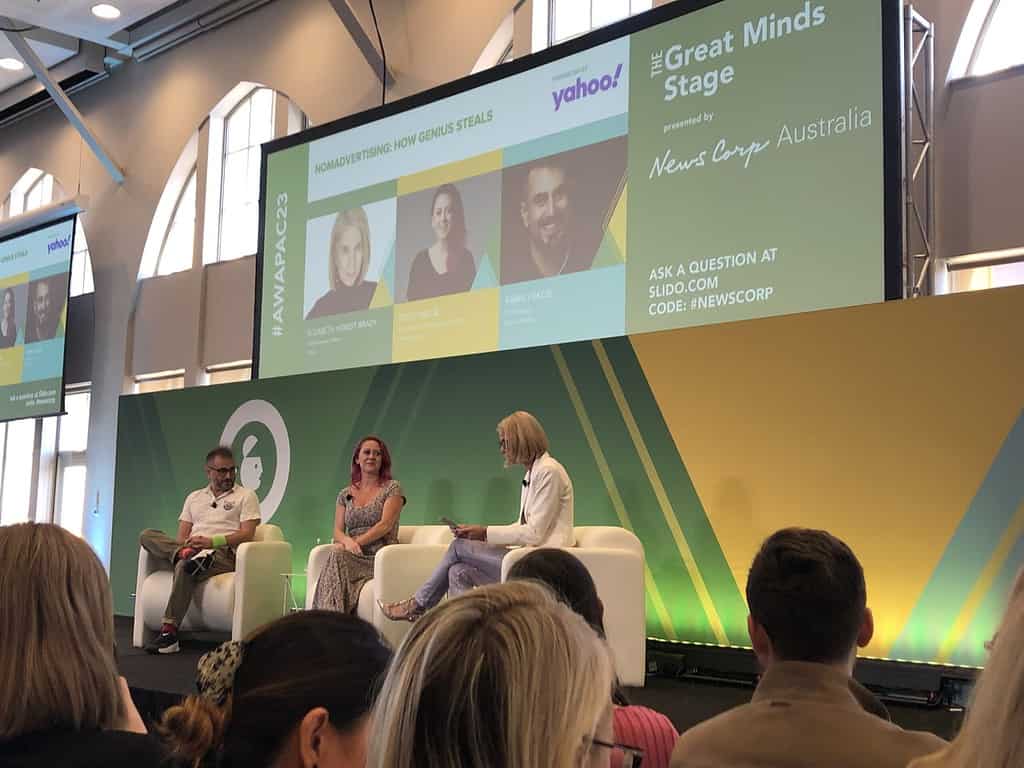
Faris and Rosie Yakob, Elizabeth Herbst-Brady
Uncomfortable Conversations – by Unstereotype Alliance
Using the Rexona Not Done Yet campaign as a springboard, this panel discussed the realities of showcasing disability in advertising.
Hosted by Sam Geer, National Managing Director at Initiative Australia, the panel was made up of Anna Tracey (Senior Marketing Manager, Unilever), Hannah Diviney (Leading Writer, Disability and Women’s Rights Advocate), Tracey Corbin-Matchett OAM (Chief Executive Officer, Bus Stop Films), and Lisa Cox (Multi-Award-Winning Author and Public Speaker).
Diviney stole the show, speaking about how when she was growing up as a kid with a disability, the only reflections she saw of herself in the media were the Paralympics and as the “after” result in road safety campaigns.
The panel left the room with the knowledge that when you include disabled people in your campaigns, you aren’t shrinking your audience – in fact, you’re expanding it.
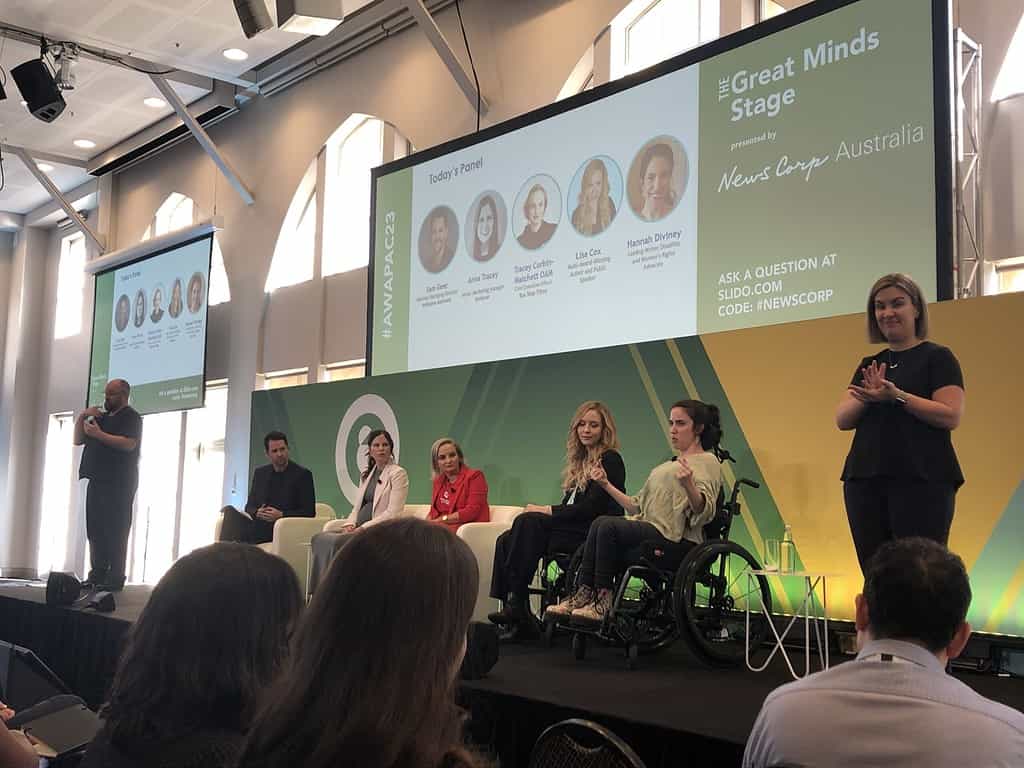
Sam Geer, Anna Tracey, Tracey Corbin-Matchett OAM, Lisa Cox, Hannah Diviney (alongside AUSLAN interpreters)
Beyond the Famous Faces
It’s one thing to market a product, it’s a whole other thing to market a whole country. Susan Coghill, Chief Marketing Officer at Tourism Australia, has that exact dilemma.
Speaking on the Great Minds Stage, Coghill told the audience that Visit Australia campaigns were about so much more than the well known Aussies they had fronting the ads – you also need passion, experience, influence, and storytelling.
However, it doesn’t hurt to have a famous face. Paul Hogan’s iconic campaign saw Australia lift from 78th most desired travel destination to 7th in a matter of months!
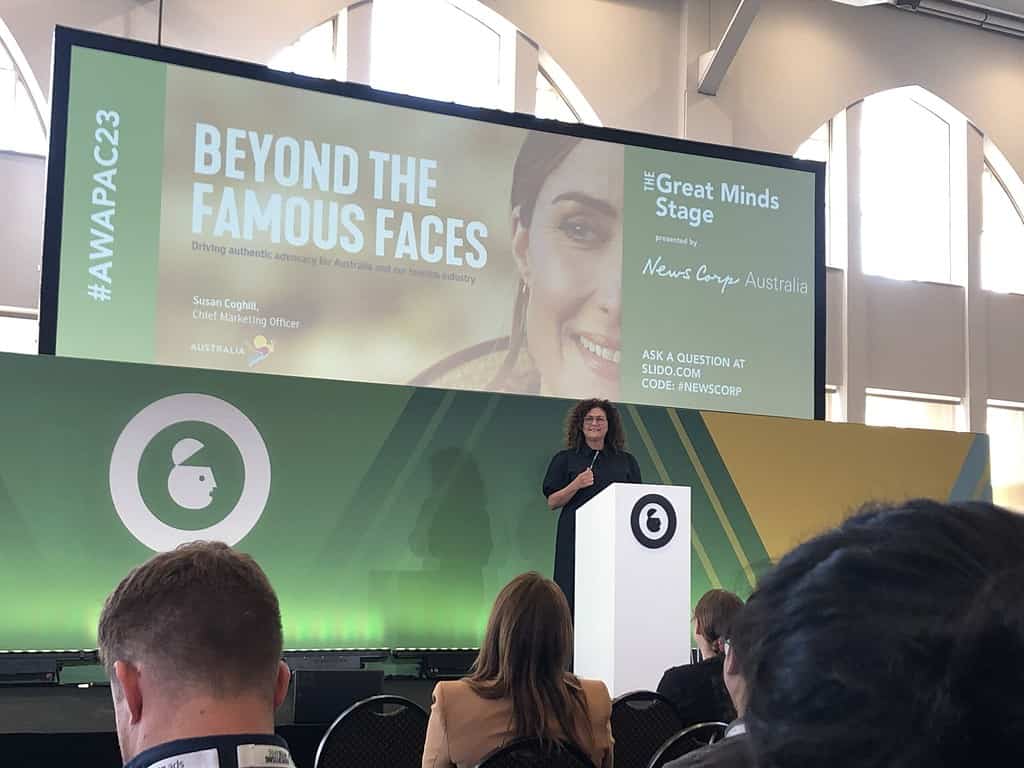
Susan Coghill
Debate Club: AI Will Be the Cause of Human Mistrust in Advertising
AI will be the cause of human mistrust in advertising – it’s a provocative statement, and one that the Debate Club was willing to tackle head on.
The Affirmative took to the stage to highlight just how scary the unknown can be – robots doing surgery? No thank you, they argued.
The Negative team took a slightly cheeky approach. AI won’t be the cause of mistrust in advertising, they argued, because advertising is already mistrusted. With the objectivity of AI, they argued that it would, in fact, improve how trustworthy advertising is.
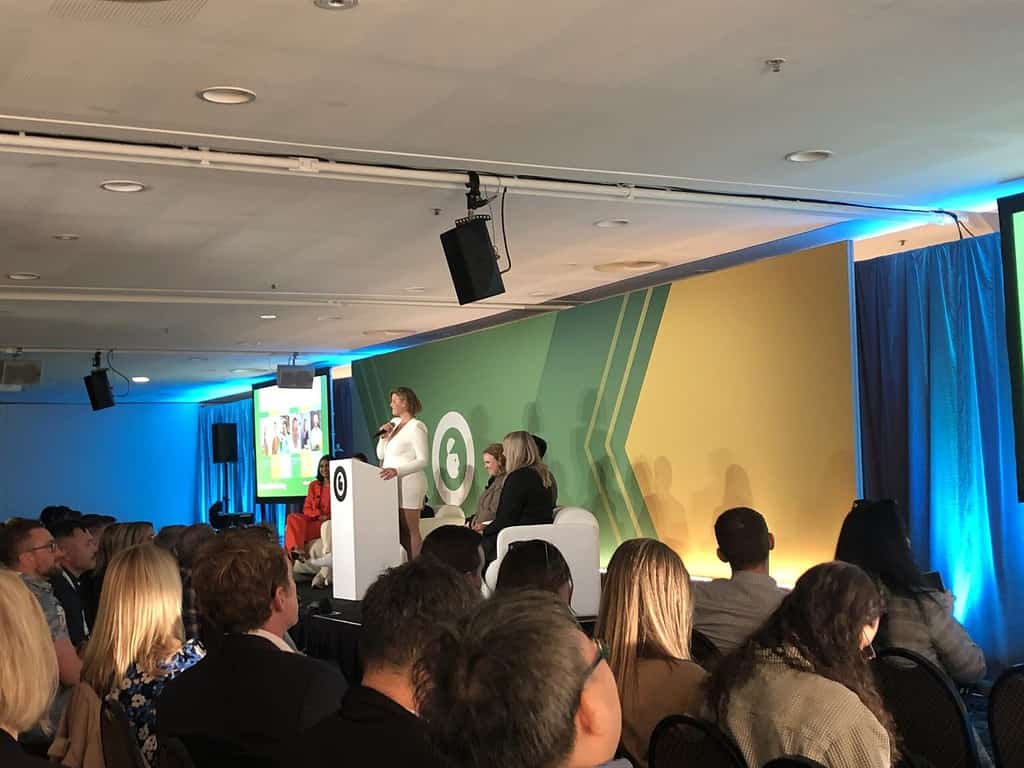
Debate Club
Embracing the Unknown: Transforming a Legacy Business in the New World
The final event of Advertising Week day one was outside of Luna Park, as a small number of people made their way to Sydney’s Beta Grand to see Karl Stefanovic interview News Corp’s Executive Chairman, Michael Miller.
Opening with a joke about the now infamous night in Noosa, Stefanovic spoke to Miller about what a day in his life looks like, how he manages the stable of News Corp assets, and the impact that News Corp has on society through its journalism.
Also from News Corp, in attendance were Renee Sycamore, Edwina McCann, Campbell Reid, Mike Connaghan Tyler Greer, Danny Lavell, Alexandra Bliekast, Kate Racovolis, and Natasha Cormier – as well as Mediaweek’s James Manning, Trent Thomas, and Tess Connery.
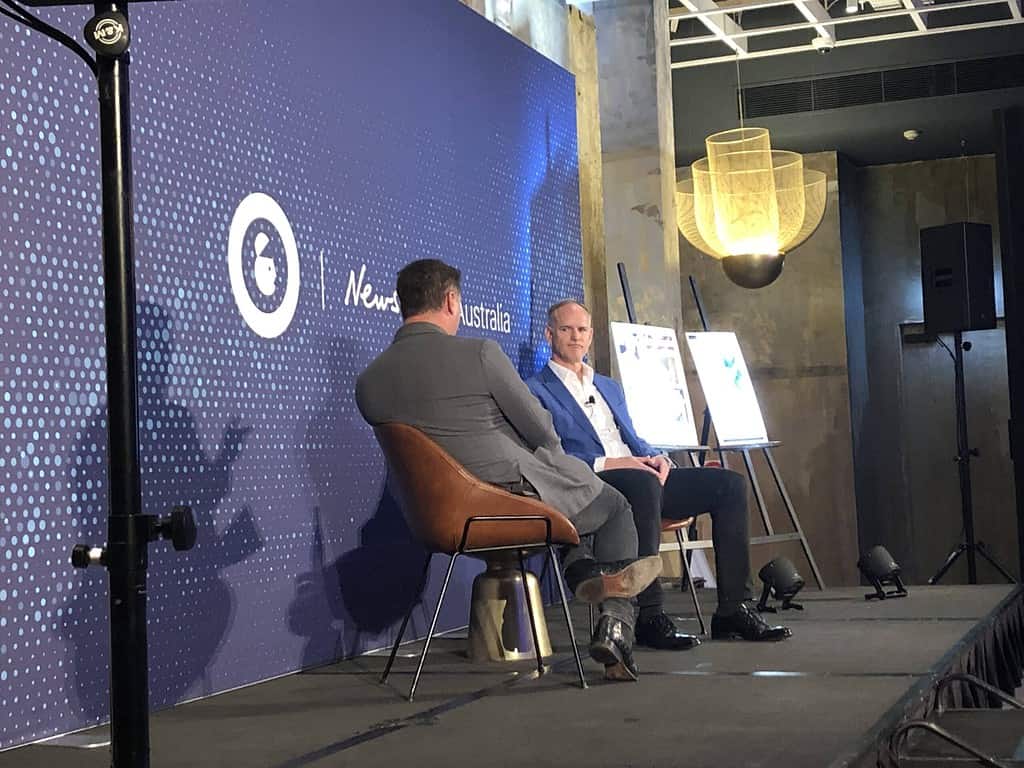
Karl Stefanovic and Michael Miller
